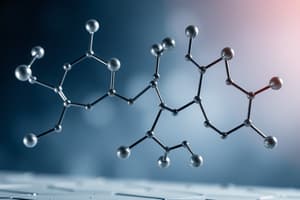Podcast
Questions and Answers
Which of the following is a correct definition of a functional group?
Which of the following is a correct definition of a functional group?
- A group of atoms/bonds that possess a variable chemical behavior
- A group of atoms/bonds that possess a predictable chemical behavior (correct)
- A group of atoms/bonds that possess no chemical behavior
- A group of atoms/bonds that possess a random chemical behavior
Which of the following is an example of a functional group?
Which of the following is an example of a functional group?
- Noble gas
- Alkyl halide (correct)
- Nucleotide
- Transition metal
Which type of carbocation is a secondary carbocation?
Which type of carbocation is a secondary carbocation?
- A carbocation with two alkyl groups attached to the positively charged carbon (correct)
- A carbocation with three alkyl groups attached to the positively charged carbon
- A carbocation with no alkyl groups attached to the positively charged carbon
- A carbocation with one alkyl group attached to the positively charged carbon
Which of the following is an example of a primary alcohol?
Which of the following is an example of a primary alcohol?
Which of the following is not a type of organic compound?
Which of the following is not a type of organic compound?
Flashcards are hidden until you start studying
Study Notes
Learning Objectives for Organic Compounds
- Learning objectives include using molecular representations to illustrate organic compounds.
- Students will learn to identify formal charges and lone pairs of electrons on atoms with complete or incomplete octets.
- Functional groups, such as alkyl halides, alkenes, alcohols, and ethers, will be identified and illustrated as groups of atoms/bonds with predictable chemical behavior.
- The terms primary, secondary, and tertiary will be used to describe functional groups and carbocations.
- Simple alkyl halides, alkenes, alcohols, aldehydes, ketones, esters, carboxylic acids, amides, and thiols will be named using IUPAC nomenclature.
- The focus of DNA is primarily on carbon rather than silicon.
- The reason for carbon being the basis of DNA instead of silicon is not explained.
- The learning objectives do not cover common names of organic compounds, only IUPAC nomenclature.
- The use of various molecular representations will aid in understanding organic compounds.
- Understanding formal charges and lone pairs of electrons is crucial for predicting chemical behavior.
- Functional groups exhibit specific chemical behavior and can be identified based on their structure.
- Naming organic compounds using IUPAC nomenclature is important for clear communication in the field.
Studying That Suits You
Use AI to generate personalized quizzes and flashcards to suit your learning preferences.




